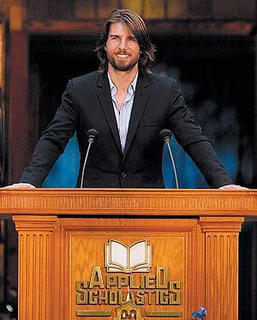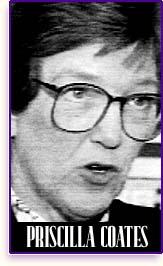
The whole TomKat phenomenon has gotten me thinking about Scientology. I first seriously looked at the whole thing in the early '90s, when I was city editor at the Glendale News-Press (back in the days before the L.A. Times bought it -- another story for another time).
At the time, Glendale was the local nexus of a group called the Cult Awareness Network, which either participated in, or at the very least condoned the "de-programming" of members of Scientology and other groups. To add to the mix, Scientology had quite a presence in Glendale and neighboring La Canada-Flintridge.
Now the word "cult" is loaded; it's a pejorative term that is applied to all-encompassing religions or groups that either offer or demand total immersion from their members and, as a result, draw the ire of those members' friends and relatives. Due to the loaded nature of the word, I do not want to call Scientology a cult but rather a philosophy/religion that demands a lot of time, money and loyalty from its members and which, like most religions of this type throughout the centuries, tends to promote both separation from the public at large, as well as a mission of proselytizing to and bringing in converts from that very same public.

Enough of that. The whole deal for me was that the Cult Awareness Network, run in the L.A. area at least by a nice lady from Glendale named Priscilla Coates, was being drowned by a number of Scientology-backed lawsuits -- a technique that church opponents say is used to silence its critics.
Well, to make a long story somewhat less so, we did a few stories about the brouhaha, and eventually a local family who had a son that had joined Scientology contacted me through CAN and claimed the guy was either brainwashed or somehow being held against his will. There are a lot of such stories about Scientology, but the closer I looked, you really don't know who or what to believe.
Sure there's "group think" aimed at keeping people in the fold, and yes, I believe a certain sort of person is attracted to Scientology and other such groups. My observation is that Scientology appeals to intelligent people who are not well-educated and who need validation of their innate intelligence -- and that includes Tom Cruise and a passel of Hollywood actors who did not take the Jodie Foster route of higher education, or in many cases, even through high school graduation.
So eventually I go to some kind of anti-cult convention near the airport, and there are a bunch of Scientologists protesting the event outside. The Scientology PR people (yes, they chain-smoke generic cigarettes, and they watch your hand while you're writing in your notebook and pause until you stop, I assume to encourage you to get it all down) ushered me toward this guy, who explained that he knew his family was unhappy with his involvement in Scientology, but he, on the other hand, was very happy with it and had no wish to leave the church.
So what can you do with a person who joins a religion like Scientology ... or the Hare Krishnas, the Unification Church, or even the Hasidic Jewish group Chabad, for that matter? (I choose these because they are all immersive groups. And like it or not, that's how some people want their religion to be). It's nice to have a fully functioning bullshit detector, but for people who don't (and who are of legal age and sound mind), what are you gonna do?

I'm sure Katie Holmes can figure this out for herself. She's what, 26? And she's been around the Hollywood cul de sac for a while (that was her in "The Ice Storm," no?) Still, if anything, this is all the more reason for young Hollywood actors to GO TO COLLEGE. I can guarantee that Scientology is NOT populated by college graduates -- people who have found other outlets, uses and validation for their intelligence.
I don't like or respect Scientology, and it's pretty easy to see right through it. But the horror stories in the anti-Scientology community haven't been followed up over the years with a whole lot of hard evidence, especially in regards to people being held against their will. A lot of religions have their unsavory aspects, some more than others. I wish I had data on the number of people flowing into and out of Scientology and other religions, but I suspect that most people who get involved in it do extricate themselves, the great majority of them sooner, a few later.
So how did the story end? Eventually the Cult Awareness Network went bankrupt (I'm sure the lawsuits didn't help), and some Scientology entity purchased the assets at auction, took over the name and began operating CAN itself. In other words, the leading group opposing Scientologists was eventually taken over by its very own Public Enemy No. 1. So you'd call the CAN number, ostensibly worried about someone you know joining a "cult" religion, and you'd be connected to a member of the Church of Scientology. It would be akin to Phyllis Schlafly taking over the National Organization for Women, Howard Dean helming the Republican National Committee, Jim Brady's widow heading the NRA, Ralph Reed leading Planned Parenthood -- you get the idea.
In short, after a whole lot of research on my part, there was no smoking gun. And it's pretty hard to draw the line about what is a "cult" and what isn't -- and there are varying degrees even under that definition. If a 20/30/40-year-old American decides to forgo Western life, shave his or her head and join a Buddhist monastary, is brainwashing or cult-think at work? Are the Amish or Hasidic Jews, or even severe Catholic religious orders considered "cults." What about splinter Mormon groups, or the mainstream Church of Jesus Christ of Latter-day Saints for that matter? It's a slippery slope to be sure. Some people want or need an intense, all-encompassing religious experience, something more than the church-on-Sunday drill. The ugly truth, and one easy to spot, is that money makes the world go 'round for many, many religious groups.
I'm not saying coercion and intimidation don't occur in these all-encompassing religions. The same thing can happen in more "traditional" groups and should be abhorred in any setting.
Would I recommend that somebody indulge their curiosity in Scientology by taking its "Personality Test" or otherwise becoming involved in the church? No. I think it's bunk. Should their friends and relatives be allowed to plead with them not to do so? Yes. Should people have the right to explore Scientology if they wish? Also yes, even though I wish they'd do so from afar.




